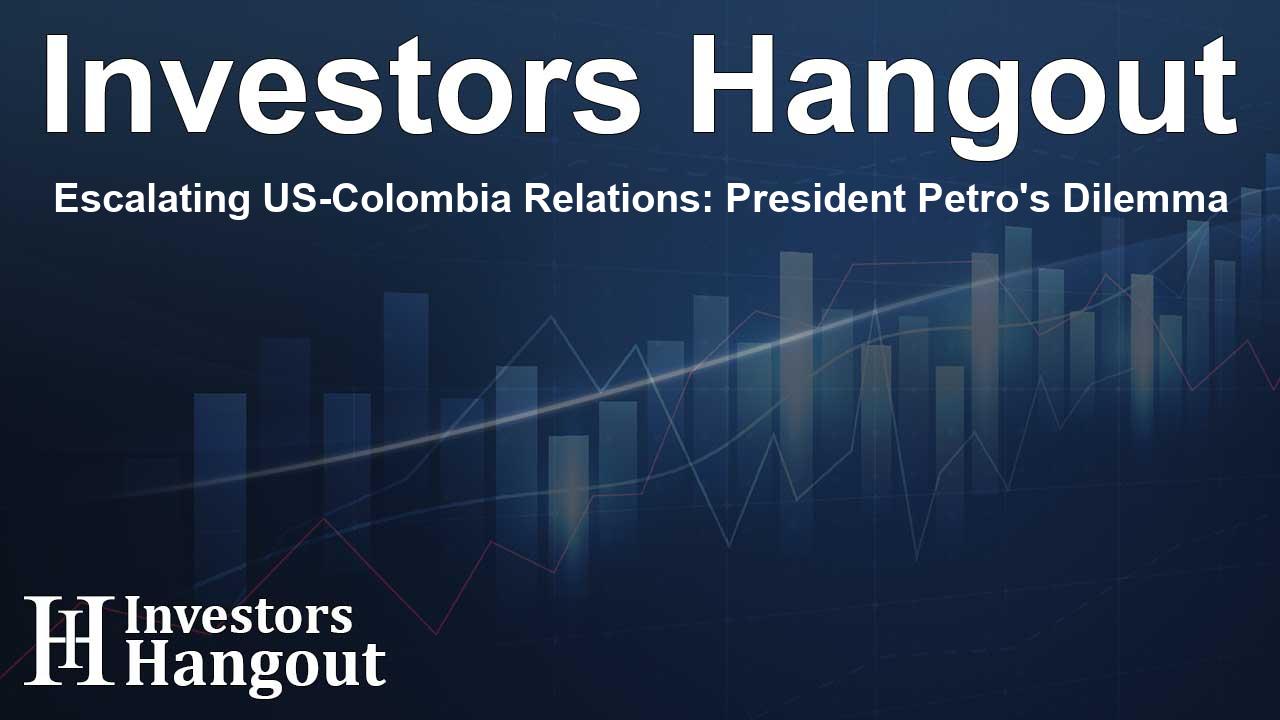Escalating US-Colombia Relations: President Petro's Dilemma

Escalating Diplomatic Tensions Between the US and Colombia
The Donald Trump administration intensified already volatile relations with Colombia by revoking President Gustavo Petro's U.S. visa. This action followed Petro's strong statements during a protest in New York, where he urged U.S. troops to disobey orders regarding the Gaza conflict.
Petro Urges US Troops to Defy Orders
President Petro, recognized as Colombia's first leftist leader, participated in a rally adjacent to the UN General Assembly, which focused on the ongoing Israel-Hamas war. His impassioned speech included a request directed at American soldiers, stating, "I ask all the soldiers of the United States' army, don't point your rifles against humanity. Disobey the orders of Trump." This call to action reflected his opposition to U.S. foreign policy and military involvement.
Immediate Response from the State Department
In swift retaliation, the State Department made an announcement on social media, labeling Petro's remarks as "reckless and incendiary." This decision to revoke his visa was intended to communicate disapproval of his comments and their potential ramifications on U.S. interests.
Upon returning to Colombia, Petro learned about his visa revocation. He responded passionately on social media, asserting, "International law grants me immunity to go to the U.N. and there should be no reprisals for my free opinion, because I am a free person." Interestingly, Petro also noted that as a European citizen, he could travel without needing a U.S. visa.
Calls for Investigation into U.S. Actions
During his later engagement at the UN General Assembly, Petro shifted focus, calling for a criminal investigation into Trump and U.S. officials for past strikes on Caribbean boats suspected of drug trafficking. He highlighted a need for clarity surrounding these military operations, further criticizing U.S. military actions and the lack of accountability.
Past Strains on US-Colombia Relations
Earlier interactions between Petro's administration and the U.S. were fraught with tension. Earlier in the year, President Petro had refused to allow U.S. military deportation flights, which led to threats from Trump regarding potential tariffs and visa restrictions. These tensions arose from disagreements over drug trafficking and anti-narcotics cooperation, which Petro believed undermined the contributions of Colombian police and civilians who have made sacrifices in the ongoing fight against drug-related crime.
Relations were further complicated when the U.S. accused Colombia of insufficient cooperation regarding anti-drug measures. Petro's government rejected these claims, emphasizing the significant human costs borne by Colombia's law enforcement and the broader public in combating drug trafficking aimed at the U.S. market.
Conclusion: The Road Ahead in US-Colombia Relations
The visa revocation saga is just one episode in the evolving narrative of U.S.-Colombia relations. With both countries facing significant challenges, open dialogue and mutual respect are critical for resolving differences. President Petro’s steadfast stance reflects a new approach to foreign relations, one that prioritizes sovereignty and accountability over subservience and silence.
Frequently Asked Questions
What prompted the revocation of President Petro's visa?
The revocation was a response to Petro’s urging of U.S. soldiers to disobey orders during a Gaza protest, deemed reckless by the State Department.
How has President Petro responded to the visa revocation?
Petro expressed his belief in international law immunity and stated that he does not require a U.S. visa due to his European citizenship.
What actions has Petro taken regarding U.S. military actions?
Petro has called for investigations into U.S. military operations in the Caribbean related to drug trafficking, questioning their legality and transparency.
How have prior U.S.-Colombia relations been strained?
Relations soured due to disagreements over the handling of drug trafficking, military deportations, and accusations of insufficient cooperation by the U.S.
What is the significance of Petro's stance in U.S.-Colombia diplomacy?
Petro’s approach marks a shift towards asserting Colombia's sovereignty and questioning U.S. actions, signaling a potential change in diplomatic dynamics.
About The Author
Contact Olivia Taylor privately here. Or send an email with ATTN: Olivia Taylor as the subject to contact@investorshangout.com.
About Investors Hangout
Investors Hangout is a leading online stock forum for financial discussion and learning, offering a wide range of free tools and resources. It draws in traders of all levels, who exchange market knowledge, investigate trading tactics, and keep an eye on industry developments in real time. Featuring financial articles, stock message boards, quotes, charts, company profiles, and live news updates. Through cooperative learning and a wealth of informational resources, it helps users from novices creating their first portfolios to experts honing their techniques. Join Investors Hangout today: https://investorshangout.com/
The content of this article is based on factual, publicly available information and does not represent legal, financial, or investment advice. Investors Hangout does not offer financial advice, and the author is not a licensed financial advisor. Consult a qualified advisor before making any financial or investment decisions based on this article. This article should not be considered advice to purchase, sell, or hold any securities or other investments. If any of the material provided here is inaccurate, please contact us for corrections.
